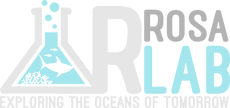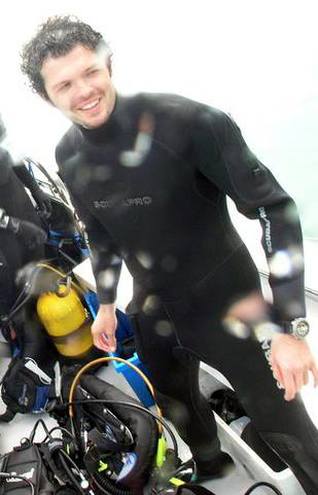|
Interests and Expertise:
Aquaculture, Biochemistry, Climate Change and Physiology. |
Tiago Repolho, Junior ResearcherTiago Repolho (TR) is an integrated researcher at the Marine and Environmental Sciences Centre (MARE, Portugal) and an invited senior lecturer at the Department of Animal Biology (FCUL, Uni. Lisbon, Portugal). He graduated in Biology (Uni. Aveiro, 2001), obtained an MSc in Biology and Marine Resources Management (FCUL, 2007) and a PhD in Marine Biology and Aquaculture (FCUL, 2012). TR was a postdoctoral researcher at MARE/FCUL, where he studied the acclimation and adaptation potential of marine biota to environmental drivers (ocean warming, ocean acidification). Since the early start of his career, TR has been gathering (national and international level) a strong multidisciplinary scientific expertise in several research fields (aquaculture, biochemistry, ecotoxicology, fisheries, global change biology, physiology, seafood safety). He is passionate about Aquaculture, Environmental, and Marine Sciences research. Taking advantage of his multidisciplinary background, TR aims to synergistically bridge these areas and his core expertise towards developing an emerging, climate-resilient and environmentally-friendly green technology, i.e. marine aquaponics (MA). Besides developing an innovative MA research line at his host and delivering novel empirical based-knowledge and technological advancements in MA research, TR intends to further support future decision-making strategies (aquaculture development, CC mitigation, env. sustainability, blue growth) in alignment with the UN 2030 agenda for sustainable development (SDGs 9&14), the EU strategy for blue growth, and the EU green deal initiative. Since 2002, TR has acted as PI (n=4), Co-PI (n=1) and senior team member in 24 national and international R&D funded projects (e.g. ERDF, FP5, EMFF, FCT, PADI foundation), besides being a PI (n=2) of additional competitive research grants (Assemble+, Company of Biologists). He has published 42 peer-review articles [H-index: 24, citations: 1372]. TR has presented 54 oral (4 by invitation) and 44 poster communications in national and international meetings. He has received national and international recognition from peers through scientific awards, grants, travelling fellowships, national and international appointments. Currently, TR is a scientific committee member of MARE (since 2019), scientific officer for SCUBA diving activities at LMG (MARE, since 2019) and elected member of the FCUL animal welfare ruling body (since 2021). Internationally, TR is a member of Frontiers in Mar. Science editorial board, leading guest editor of a special issue (Biology, MDPI), member of the Society for Open, Reliable, and Transparent Ecology and Evolutionary Biology (SORTEE) and member of the Global Ocean Acidification Observing Network (GOA-ON). Additionally, TR acts as an invited reviewer for international publishers (peer-reviewed journals, book proposals, since 2011) and as evaluator and rapporteur (biological and environmental sciences) to prestigious national (ANI) and international organizations (e.g. US National Science Foundation, Dutch Research Council, EU REA, since 2016). Besides his recent appointment as a senior invited lecturer (MSc in Marine Ecology, FCUL, 2021), he has also been an invited lecturer within national academic institutions (MSc and BSc courses. FCUL, Uni. of Aveiro, Inst. Politécnico Santarém, since 2004). Currently, TR supervises 1 PhD student, 2 MSc students and 1 MSc research scholar. He provides advanced course training to PhD students (doctoral programs in Biology and Marine Sciences, FCUL, since 2015) and experimental tutoring to MSc and PhD students (since 2012). Currently, his international research network spreads over Europe, the USA, Australia and South America. His commitment is also science outreach-oriented (e.g. 52 school outreach activities since 2016). He is an objective-driven professional, always looking to undertake new professional challenges and opportunities academically and privately.
|
Academic Qualifications |
2012. Ph.D. in Marine Biology and Aquaculture, Faculty of Sciences, University of Lisbon , Portugal
2007. MSc in Biology and Marine Resource Management, Faculty of Sciences, University of Lisbon, Portugal 2001. BSc in Biology, University of Aveiro, Portugal. |
Awards and Grants
|
2018. Outstanding Reviewing Contribution - Science of the Total Environment journal
2018. Outstanding Reviewing Contribution - Ecotoxicology and Environmental Safety journal 2017. Recognized reviewer - Ecotoxicology and Environmental Safety journal 2017. Recognized Reviewer - Science of the Total Environment journal 2016. Travelling Fellowship - Journal of Experimental Biology / Company of Biologists 2016. Travelling Fellowship - 4th International Symposium on the Ocean in a High-CO2 World (Hobart, Tasmania) 2014. Travelling Fellowship (Sven Lovén Centre for Marine Sciences, University of Gothenburg, Sweden) 2014. Team-spirit Award (Rui Rosa Lab, MARE-Marine and Environmental Sciences Centre, Portugal) 2014. Best Oral Group Presentation (CeMEB Advanced Course: Marine Evolution under Climate Change, Sven Lovén Centre for Marine Science, University of Gothenburg, Sweden) 2013. Postdoctoral Fellowship. Portuguese Foundation for Science and Technology (FCT, Portugal) 2008. PhD scholarship. Portuguese Foundation for Science and Technology (FCT, Portugal) 2001. Travelling Fellowship "Oceanographic Training course" (Baltic Floating University, Student Mobility Action, T-JEP-10814-99). Intergovernmental Oceanographic Commission (IOC) 2000. Erasmus+ scholarship (Department of Fisheries and Marine Biology, Department of Molecular Biology, University of Bergen, Norway) |
Publications |
THESIS
2012. Repolho T. Evaluation of Paracentrotus lividus (Lamarck, 1816) exotrophic larvae as live feed for marine decapod crustacean larvae. PhD Thesis. Faculty of Sciences, University of Lisbon 2007. Repolho T. Effect of sea urchin Paracentrotus lividus (Lamarck, 1816) broodstock diet on larvae development. MSc Thesis. Faculty of Sciences, University of Lisbon. 2001. Repolho T. Intra and Inter-individual ITS variation in cod (Gadus morhua) reared under identical (light/feeding) and different water temperature (8°, 12° and 15°C) conditions: Inter-species comparative analysis with other teleost fishes. BSc Thesis. University of Aveiro, Portugal / University of Bergen, Norway PUBLICATIONS IN INTERNATIONAL PEER-REVIEWED JOURNALS
|






